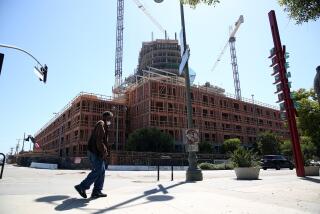Chinese Officials Will Meet in O.C. With U.S. Builders
- Share via
One billion residents. It is a phrase that resonates in the minds of American business owners hoping to find a way to cash in on the liberalization of the Chinese economy.
But as more businesses explore profit opportunities in Asia’s most populous nation, they find that making their millions will not be as simple as selling just one widget to each of China’s 1 billion consumers.
Real estate construction is expected to thrive in China, where there is explosive demand for both commercial and residential development as the Chinese government prepares to upgrade the country’s housing stock. Businesses also need manufacturing plants and other commercial space, and the Chinese are actively seeking expertise from American builders.
On Monday, a delegation of officials from China’s Ministry of Construction will be in Orange County at a seminar organized by the Geneva Cos. in Irvine to meet with a group of American business representatives.
According to Geneva, which has offices in Beijing, there is substantial potential for real estate developers to capitalize on China’s growth. More than 6 million square feet of urban housing was constructed in China in 1993, and real estate construction in China is expected to grow 18% annually through 2000. Much of the development will be funded through the Chinese government’s plan to spend more than $25 billion on affordable housing through 1996.
But U.S. real estate developers, like other foreign investors, face difficulties when setting up operations in China.
American companies need to brace themselves for different laws and customs, and be prepared to advance millions of dollars to gain entrance, according to Richard Klein, a partner in the Los Angeles office of Kenneth Leventhal & Co.
China will not allow foreign real estate companies to buy the land being developed there. Instead, the nation only offers long-term land leases of up to 70 years. And rather than pay rent on a monthly basis, the government--China’s only landlord--demands a lump sum payment up front for the 50 or more years the structures would occupy the land.
And because their products--apartments, warehouses, office buildings--will be sold in China, developers would have to form a joint venture with a Chinese company, according to Klein. On most occasions, the Americans are brought in as an equity partner, which means they assume the majority of the risk.
“It is a very tricky economic and political structure to work in,” said Klein.
Still, there are those who are game. A spokesman for the Koll Co. in Newport Beach said that company has investigated commercial development opportunities in China for the past year. “It is a little bit like wildcatting for oil,” he said. “It is hit or miss.”
More to Read
Inside the business of entertainment
The Wide Shot brings you news, analysis and insights on everything from streaming wars to production — and what it all means for the future.
You may occasionally receive promotional content from the Los Angeles Times.









